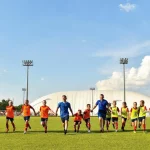The SFA has introduced their new ‘Player Journey,’ replacing the former ‘Player Pathway’ All SYFA small-sided teams should be sure to follow this format


The SFA has introduced their new ‘Player Journey,’ replacing the former ‘Player Pathway’ All SYFA small-sided teams should be sure to follow this format


Applications for the 2025 intake of Scottish FA JD Performance School pupils are now open.
The next intake is open to Primary 7 pupils entering S1 in August 2025 with the programme for players who are eligible to play for Scotland.
The Scottish FA JD Performance Schools are designed for the best young players in Scotland. Watch the video below to see the minimum level expected from applicants.
Pro application: For children currently registered with SPFL clubs only.
Grassroots application: For children not registered with an SPFL club.
Application window is now open.
Complete Professional Club Application here.
Complete Grassroots Application here.
You can register to attend our Information Evening online via the form below, this takes place on Monday, 3 February.

Celebrating 30 Years of ERSDA: A Legacy of Youth Soccer Development
In 2025, the East Renfrewshire Soccer Development Association (ERSDA) proudly celebrates its 30th anniversary. Since its establishment in 1995, ERSDA has been a cornerstone of youth soccer in the East Renfrewshire area of Scotland, fostering a strong community of players, coaches, parents, and fans dedicated to promoting fair play, sportsmanship, and player development.
A Journey of Growth and Achievement
What began with just 23 teams has blossomed into a vibrant organization with over 100 teams competing across various age groups. ERSDA’s structured development programs, including 4s, 5s, and 7-a-side football for children aged 7 to 12, have provided a nurturing environment for young players to develop their skills, build lasting friendships, and experience the joy of the beautiful game.
Expanding Horizons
Over the years, ERSDA has continued to expand its offerings, now including Saturday 11-a-side leagues for players aged 13-17. This expansion has allowed even more young talents to participate in the sport, enhancing their footballing journey and providing opportunities for advancement.
Community and Sportsmanship
ERSDA is more than just a football league; it’s a community dedicated to the development and enjoyment of young players. The association’s commitment to fair play and sportsmanship has earned it a reputation for doing things the right way, ensuring that players not only develop their football skills but also learn valuable life lessons.
Honouring the Committee Members & the dedicated folk behind the scenes
The success of ERSDA would not be possible without the dedication and hard work of its committee members and the numerous people behind the scenes who contribute many hours making sure that ERSDA continues to grow and improve year on year! but, without the coaches, parents & guardians and most of all the hundreds of young players who take to the pitches every week in all types of weather the East Renfrewshire soccer development league would not exist.
Looking Ahead
As ERSDA celebrates its 30th anniversary, it looks forward to continuing its mission of promoting youth soccer development in East Renfrewshire. The association invites players, coaches, parents, and volunteers to join in this exciting journey, ensuring that the next generation of young footballers can enjoy the benefits of playing in a supportive and nurturing environment.

Please note weather warnings are in place for across Renfrewshire today and tomorrow (7th/8th Dec) please check that your match is on before travelling and leave plenty of time as delays due to flooding in some areas. Take care driving and remember to take a brolly 🙂

Courtesy of Team Grassroots
Over the coming months, many coaches will brave winter conditions to deliver coaching sessions to young players. Here, FA regional coach development manager, Martin Dighton, provides ten top tips to help fully engage with players when working outdoors.
1) Young children are not mini-versions of adults
As much as they will be adults one day, the young players in your care are certainly not there yet. We must understand and recognise that we can’t treat them in the same way as we would our peers. We must always have the well-being of each of the children in our care as the priority. The session must fully engage the young players no matter what the weather.
2) Get the players moving as soon as they arrive
In poor weather keeping the players busy is vital. Young children will go cold quickly – almost without noticing – and once they are cold they will really struggle to warm up again. Telling them to run around a bit more won’t help either unfortunately – it’s too late by then.
An arrival activity is vital. The children should arrive warm and getting them active early is crucial. Little games of tag, mini 1v1s or 2v2s, and small fundamental movement games will all do this. Make sure you have this section in your session plan ready to go whatever the weather.
3) No queues and keep all the players involved
Having queues of children waiting for their turn is a big no-no in any session let alone on a cold, wet day. Can you find ways to make sure all the players are all involved all of the time? If you are struggling for equipment could you set up two or three smaller areas rather than one in order to cut down any form of waiting?
4) Use games during training
Consider what the players expect football to look like. What’s the first question they ask: ‘When are we playing a match?’ Wet and cold sessions are perfect for match time as it keeps them all involved and active. Play mini 3v3s on a couple of pitches to keep all involved and then carefully manage how you intervene to coach.
5) Work with individuals rather than stopping the whole group
Children don’t like coaches talking for ages at the best of times but on a wet day it’s even more important to keep communication concise. Can you coach individuals whilst the game plays on around them? Could you give quick challenges to players ‘on the fly’ as they pass you? Could you set yourself a challenge to intervene for no longer than 30 seconds? The kids would really appreciate this.
6) Consider practice design and progression
Spend time on planning the session. Will you use a technique-skill-game format or whole-part-whole or a myriad of other templates? Which will increase playing time the most and which may lead to times of relative inactivity? How can you create excitement and therefore engagement? Can you always have a scoring system in place? Can you ensure that if any defender wins the ball they have a way to attack and score too to keep games flowing?
How you progress the session needs to be thought about too. Can you progress some players without stopping all of them at the same time? Think about working the session with players in groups; perhaps advance the better players first before gradually progressing the weaker players later on, meaning that they’ll get the extra practice time they need. This also means that as you talk to each group two-thirds of your team are still active and warm.
7) If in doubt: play matches
If you’re ever in doubt or get caught by the rain or bad weather half-way through a session revert back to several small matches. Smaller sized matches promote ball contacts, in and out of possession play, transition and game craft. They also ensure that players are never more than one pass away from the ball, so engagement and activity levels stay high.
8) Have some rules about correct kit
It’s important to have some rules or conditions regarding kit. I’ve had children arriving in t-shirt and shorts to sessions in December and I’ve had to take the hard decision to turn them away. Parents sometimes feel that it’s okay because they’ll be running around at football – yes, but they will only be warm if they start warm in the first place. Perhaps having a club wet-weather policy would be a good idea?
We can take note from cricketers playing in early April or late September. They wear lots of thin layers rather than a couple of large ones to keep heat in. Encourage your players to do the same. It’s nothing different to what my mum used to shout as I ran off to training: “You can always take some off, if you get too hot”.
9) Safety and welfare are top priority, but each individual is different
We have a responsibility to the children and their parents to look after them and always to make decisions in their best interests. Safety and welfare are the top priority but we also mustn’t shy away from playing just because the weather isn’t great.
In a grassroots setting I worked in previously we had a rule – if the kids turned up then we would play. It was the choice of the group and their parents if we played. This meant that sometimes we played for just 30 minutes instead of the full hour, sometimes the session plan went out of the window and we just played little games and sometimes we led sessions with only three or four kids.
What we must always understand is that every child is different, some will love and thrive in the terrible weather whereas others will hate it. Either way, they are both likely to remember it for a life time.
We must make certain that our coaching fosters a love of the game and a love of playing it. Make sure that when you are next faced with bad weather you make decisions and plans based on the best interests of the little people that turn up each week to play the great game of football with you.
10) Find a way to use the weather to create memories
Some of my fondest experiences as a kid were playing outside in terrible weather. I still remember my first game in snow and the excitement playing with an orange ball for the first time gave us, the sliding tackles that seemed to last a full 30 yards through the midfield mud-pit and the diving headers that gave such a splash landing that if you timed it well could soak the watching parents.
We must appreciate that we could be building memories for our players; let’s make sure they are positive ones where the kids can’t wait to play the next time it rains. Starting to implement all of the above is a good foundation to start from.
Courtesy of The FA.


With lots of teams now in possession of VEO cameras we have added a new section to the ERSDA website where you can view highlights of matches from the ERSDA leagues. If you would like to feature your match highlights on the site then please share your links using the whatsapp link at the bottom of the screen. Watch highlights HERE or from the main menu above ERSDA TV.

The date for all of the ERSDA Cup, Plates and Bowls has been announced ! All finals will take place on Sunday May 12th at Auldhouse, located at the Giffnock soccer centre. A massive thanks to Giffnock for the use of their facilities to host the finals.
Please see below for the match schedules as well as other important information for everyone attending. Let’s make it a great day !
| Pitch One | Time | Fixture | Team 1 | Team 2 |
|---|---|---|---|---|
| Match 1 | 09:15 | 2011 Div 1 Cup | EKYC BLUE | OLA |
| Match 4 | 11:00 | 2011 Div 2 Cup | EKYC Yellow | Whitacre Wolves |
| Match 7 | 12:45 | 2010 Div 2 Bowl | Langcraigs | St Andrews Blue |
| Match 10 | 14:30 | 2010 Div 2 Cup | Thorn Athletic | Renfrew |
| Pitch Two | Time | Fixture | Team 1 | Team 2 |
|---|---|---|---|---|
| Match 2 | 09:45 | 2011 Div 1 Plate | Utd Juniors | OLM Utd |
| Match 5 | 11:30 | 2011 Div 1 Bowl | Claremont Blue | Barrhead |
| Match 8 | 13:15 | 2010 Div 1 Plate | EKRR | Whitacre Wolves |
| Match 11 | 15:00 | 2010 Div 3 Bowl | Whitacre W Black | OLM |
| Pitch 3 | Time | Fixture | Team 1 | Team 2 |
|---|---|---|---|---|
| Match 3 | 10:15 | 2010 Div 3 Plate | St Andrews White | Stamperland Ath |
| Match 6 | 12:00 | 2011 Div 2 Plate | Clydebank Black | Yoker |
| Match 9 | 13:45 | 2011 Div 2 Bowl | Third Lanark | St Cadocs Athletic |
| Match 12 | 15:30 | 2010 Div 2 Plate | St Mirren | Pollock Utd |
Presentations will take place 5 mins after games conclude. Both teams are requested to make their way to the presentation area in a timely fashion.
Presentations for any league competitions that have been decided will take place at the same time as cup presentations.
Food and drink is available to purchase in the clubhouse – please support the café as proceeds go to new pitches (which will benefit all). Changing facilities and toilets are located here also.
There is a limited amount of parking due to construction activity on site. Car-sharing is advised, and considerate parking following wardens instructions is requested.
Teams for games 1,2,3 are requested to assemble 1 goal each prior to play. Teams for games 10,11,12 are requested to dissassemble 1 goal each after play concludes.
Please remove all litter from pitch side at the end of the game, and place it in the bags provided.
Spectators should remain 2 metres from the touchline at all times, and to conduct themselves according to the ERSDA grassroots charter. No spectators allowed in the strip between pitches 1 and 2.
Each team may be asked to provide a parent volunteer to act as a car-parking warden for part of the day. The timing of the task will be adjacent to, but not-overlapping with, their team’s game.
An explanation of the car parking task will be provided in full, and the required timings specified, prior to 12th May.
All games will be played on grass.
Games will be 2x 35 minute halves.
At the end of 70 minutes, if the game is tied, the result will be decided by penalty shootout in line with iFAB conventions.
For each game, there shall be a referee and two linespeople, and the normal 11-a-side rules and parameters, as laid out by the SYFA, will apply.
There are no trialists allowed in any ERSDA cup fixtures. Any player that has played for another team in any ERSDA cup fixture will be cup-tied.
As per SYFA guidelines, the only exception to this rule is for the goalkeeper position. Permission to draft emergency cover for this position must be sought in advance in writing.
We also ask teams to respect the league request to not use the short-term registration / deregistration practice recently debated across age groups.
To preserve the integrity of Finals day, the history of SYFA player IDs listed on teamlines will be spot-checked by ERSDA officials.
Cup final day is an ERSDA fixture. Suspensions to be served following any recent ERSDA league or cup games will apply to Finals day.
If any team is found to be in breach of player registration rules, then the match shall be played as a friendly, and the trophy awarded to the opposition with a 1-0 result.
Teams are requested to submit their chosen team colours to their league coordinator by Tuesday 7th May.
Where there is a clash of colours, a coin toss by ERSDA officials will decide which team gets to select their kit.
GSC have generously donated the use of the facility to ERSDA for the 12th May, so there are no pitch costs to cover.
The match official fees are £150 per game. Each team should pay £50, and ERSDA will also pay £50, per match.
Teams that are playing on alternative dates will be required to cover the costs of pitch hire, and one match official each. ERSDA will also provide £50 for a match official fee
Each team should bring at least one match ball (size 4 – 2011, size 5 – 2010). Nets will be provided by Giffnock.
There is a warm up pitch area which is available for all teams until 3.15 pm. Please share the space respectfully, and avoid warming up directly adjacent to match pitches
The facility will be busy – please act in a considerate way at all times to make the best experience for all
And a reminder that ERSDA is run entirely by volunteers and the clubs that make it up. Please play your part in helping as required to give our players a day to remember
If you are driving, please make contingency plans should car parking be full at the ground.
Don’t give car park volunteers hassle – when parking is full, they will ask you to find an alternative.
Consider nearby alternatives to park and walk, and/or use the drop-off area for players at the entrance to the ground.
Note the Thornliebank Railway Bridge (X in the diagram) is closed so a diversion is in place. Plan your route accordingly.
The train station at Thornliebank is serviced by the Central to East Kilbride line, and is a couple of minutes walk to the ground
There are car parks at various stations on this train line, and services every 30 minutes
There will be zero tolerance of abuse / hassle given to the officials. Any players, coaches or spectators unable to follow this approach will be asked to leave the pitch area, and play will be


UEFA has teamed up with iCoachKids to provide new coach education modules for those thinking of or already working in the grassroots game.
To help people thinking of getting involved with coaching, as well as existing coaches, teachers, volunteers and parents, UEFA has teamed up with iCoachKids, a not-for-profit global coaching movement, to provide a free learning tool to help deliver the best sessions possible.
The UEFA iCoachKids e-learning courses have been launched to help all UEFA member national associations to offer those working with children a comprehensive online coach education resource.
Visit the Coaches page from the main menu or click here for more information.

After what probably feels like forever for all the kids playing in the Ersda small sided teams, the new 2024 season is just around the corner!
The coaches of our small sided teams from age groups 2012’s though to 2018’s can find all the information they need from either the downloads section or from their age groups page from the menu above, including rules, format guides, venue information as well as the much anticipated fixtures.
Good luck to all the kids involved in the small sided teams !
